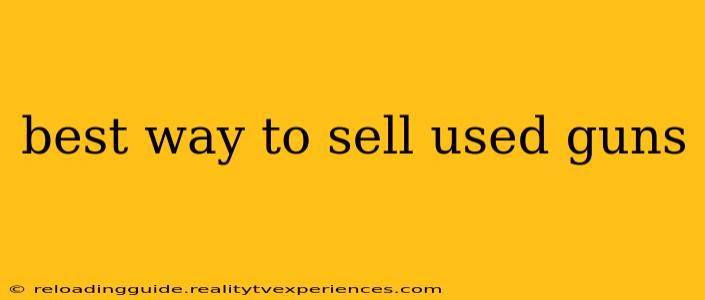Selling a used firearm can feel daunting, but understanding the legal landscape and employing smart strategies can make the process smooth and safe. This guide outlines the best practices for selling used guns, ensuring both legal compliance and a successful transaction.
Understanding the Legal Framework: Navigating State and Federal Regulations
Before even listing your firearm, it's crucial to understand the complex web of federal and state laws governing firearm sales. These regulations vary significantly, so researching your specific state's laws is paramount. Key aspects to consider include:
- Federal regulations: The Bureau of Alcohol, Tobacco, Firearms and Explosives (ATF) sets the overarching framework. Private gun sales often require background checks, especially if conducted across state lines. Failure to comply can lead to severe penalties.
- State-specific laws: Each state has its own unique regulations, covering aspects like licensing, registration, waiting periods, and permitted transfer locations. Some states have stricter rules than others, potentially requiring licensed dealers to handle the transaction.
- Background checks: Many states mandate background checks for all firearm transfers, regardless of whether the seller is a licensed dealer. This usually involves using a licensed firearms dealer who can conduct the necessary check through the National Instant Criminal Background Check System (NICS).
Disclaimer: This information is for educational purposes only and does not constitute legal advice. Always consult with legal counsel or your local law enforcement agency to ensure compliance with all applicable laws and regulations.
Choosing Your Sales Platform: Options and Considerations
Selecting the right platform is key to reaching the right buyers and ensuring a secure transaction. Consider these options:
1. Licensed Firearms Dealers:
- Pros: Handles all legal paperwork and background checks, simplifying the process and mitigating legal risks. Offers a safe and regulated environment for both buyer and seller.
- Cons: You'll receive less money than selling privately due to the dealer's fees and markup. May require additional paperwork and potentially a waiting period.
2. Online Gun Forums and Marketplaces:
- Pros: Access to a larger pool of potential buyers. Allows for detailed descriptions and high-quality photos.
- Cons: Increased risk of scams and fraudulent buyers. Requires careful screening of potential buyers and adherence to all relevant legal regulations. You are responsible for managing all legal aspects of the sale.
3. Private Sales (with appropriate legal compliance):
- Pros: Potentially higher sale price due to the absence of dealer fees.
- Cons: Requires meticulous attention to legal compliance, including conducting background checks (where required). Significantly higher risk of scams and legal complications.
Optimizing Your Listing for Success: Attracting the Right Buyers
Regardless of your chosen platform, crafting a compelling listing is critical:
- High-Quality Photos: Showcase the firearm's condition with clear, well-lit photos from multiple angles.
- Detailed Description: Include make, model, caliber, condition (excellent, good, fair), any modifications, and any included accessories. Be upfront about any flaws.
- Competitive Pricing: Research comparable firearms to determine a fair market price.
- Clear Communication: Be responsive to inquiries and provide detailed answers to potential buyers' questions.
- Safe Transaction Procedures: Establish clear procedures for meeting the buyer, exchanging funds, and transferring the firearm. Prioritize safety for both parties.
Prioritizing Safety and Security: Protecting Yourself and the Buyer
Throughout the selling process, prioritizing safety and security is paramount:
- Meet in a Public Place: Choose a well-lit, public location for the transaction, preferably with surveillance cameras. Never meet alone.
- Verify Identification: Ensure you have verified the buyer's identity and legal right to purchase a firearm.
- Secure the Firearm: Transport the firearm securely and unloaded.
- Proper Paperwork: Complete all necessary paperwork accurately and legally.
Selling used guns requires careful planning and attention to detail. By understanding legal requirements, using appropriate sales channels, and prioritizing safety, you can navigate the process successfully and responsibly. Remember, compliance with all applicable laws is not only legally required but also essential for ensuring a safe and secure transaction for everyone involved.

